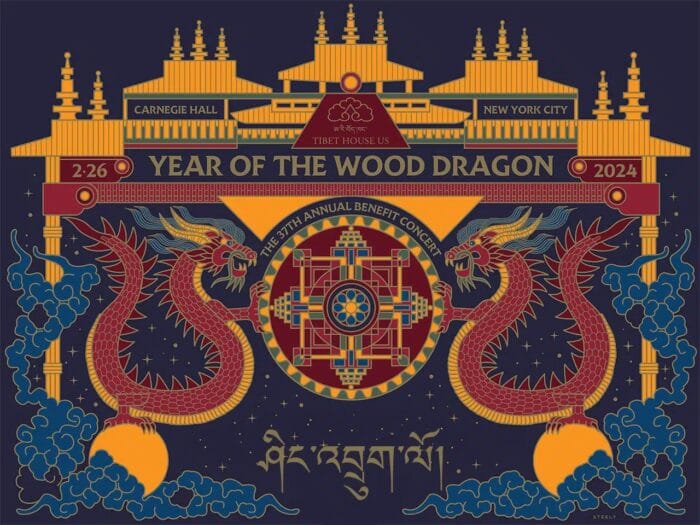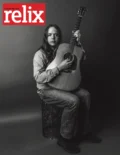Photo Credit: Noam Galai, Ilya Savenok for Getty Images, Courtesy of Tibet House US
On Monday, Feb. 26, Tibet House presented its 37th annual benefit concert at Carnegie Hall’s hallowed Stern Auditorium. Brought to life by long-time artistic directors Philip Glass and Laurie Anderson, this year’s event lived up to its reputation for upholding the highest standard of music, art and cultural interchange by presenting performances from Anderson, Maggie Rogers, Philip Glass Ensemble, Joan Baez and more. These elite artists, brought together under than banner of the 37-year Tibet House organization’s noble cause, cultivated an atmosphere humming with innovation, giving rise to a slew of unforgettable one-night-only collaborations.
Following the sonorous chants of the Tibetan Monks, who focused the fervent energy of the space squarely on the stage, esteemed Buddhist author and educator and Tibet House president Bob Thurman delivered introductory remarks, welcoming the crowd for an evening of contemplation and cultural appreciation.
After this preface, Anderson assumed the spotlight, with a freely flowing series of spacious soundscapes and meditations, reminiscent of her 2019 project Songs from the Bardo, with support from Martha Mooke, Shazad Ismaily, Gina Gershon and Tibetan multi-instrumentalist Tenzin Choegyal, who is featured on the album. This journey culminated in Anderson’s 1982 Big Science classic “Walk the Dog,” after which the artist departed from the stage, leaving Choegyal to present “Himalaya” and Tibetan national anthem “Gyallu” alongside recent Grammy winners Scorchio Quartet.
Next, Maya Hawke rose to perform a yet-unreleased original titled “Hang In There,” with accompaniment from Christin Lee Hutson, Ismaily and Scorchio Quartet. The rising folk-pop artist dedicated her second song, “Black Ice,” to Ganden Thurman, Executive Director of Tibet House and her uncle. Indie-folk singer-songwriter Hutson remained onstage for moving solo renditions of two original compositions, “Northsiders” and “Afterhours,” before inviting pathbreaking footwork producer Jlin to the stage for a rendition of her jittery, thumping single “The Precision of Infinity,” which features Glass. From the storied stage, Jlin moved the crowd with the tearful confession, “I never thought as a Black woman from Gary, Indiana I’d be here at Carnegie Hall.”
Philip Glass Ensemble proceeded from this touching moment with Part Eight of Glass’ seminal “Music in Twelve Parts,” a richly textural sonic tapestry that enfolded the hall in its interrelated stages like a woven Tibetan mandala. Glass observed this stunning work from a box adjacent to the stage, which was illuminated in a salute to the artist at the work’s end. SNL’s Bowen Yang then introduced some levity before delivering a dynamic reading of Allen Ginsberg’s “Who Be Kind To” with backing from The Patti Smith Band.
Following his oration, Yang, invited Maggie Rogers to the stage, who presented an unconventional slow-burn version of her 2016 smash “Alaska” with Scorchio Quartet and “Don’t Forget Me,” the title track from her recently-announced forthcoming album, alongside The Patti Smith Band. After her entries, Rogers experienced the greatest honor of [her] life” in introducing folk icon and lifelong activist Joan Baez, who stormed the stage with a wide-eyed and resonantly hopeful treatment of the Steve Earle-penned “God Is God.” Baez then invited Rogers to return to the stage for a surprise duet of Bob Dylan’s “Don’t Think Twice, It’s Alright,” before welcoming Anderson, The Patti Smith Band, Ismaily, Choegyal and Jlin to join in a collaboration of Baez’s beloved “There But For Fortune.”
Gogol Bordello was last act to perform in the stacked series, opening with a treatment of “Mi Companera” dedicated to the Tibetan people and refugees and countries calling out for freedom all over the world. The New York-based Ukrainian punk ensemble kept the energy at a roar with “When Universes Collide” and an anthemic staging of “Solidarity,” its 2023 benefit single for Ukraine, that brought Baez, Rogers, Hawke and Yang to the stage to dance along. Finally, the full company of the concert rejoined on stage for an earth-shaking treatment of “We Shall Overcome,” leaving the audience at once returned to a natural, hopeful peace and anxiously awaiting the concert’s return next year.
To learn more about Tibet House and its mission to preserve Tibetan culture and ensure its future, visit thus.org.





No Comments comments associated with this post